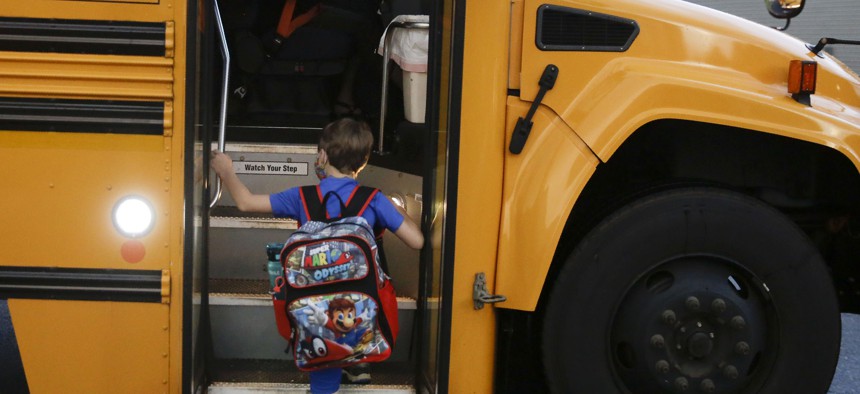Schools Aren’t Super-Spreaders

Paul Adamus, 7, climbs the stairs of a bus before the fist day of school on Aug. 3, 2020, in Dallas, Ga. AP Photo
COMMENTARY | Fears from the summer appear to have been overblown.
In early August, the first kids in America went back to school during the pandemic. Many of these openings happened in areas where cases were high or growing: in Georgia, Indiana, Florida. Parents, teachers, and scientists feared what might happen next. The New York Times reported that, in parts of Georgia, a school of 1,000 kids could expect to see 20 or 30 people arrive with Covid-19 during week one. Many assumed that school infections would balloon and spread outward to the broader community, triggering new waves. On social media, people shared pictures of high schools with crowded hallways and no masking as if to say I told you so.
Fear and bad press slowed down or canceled school reopenings elsewhere. Many large urban school districts chose not to open for in-person instruction, even in places with relatively low positivity rates. Chicago, L.A., Houston—all remote, at least so far.
It’s now October. We are starting to get an evidence-based picture of how school reopenings and remote learning are going (those photos of hallways don’t count), and the evidence is pointing in one direction. Schools do not, in fact, appear to be a major spreader of Covid-19.
Since early last month, I’ve been working with a group of data scientists at the technology company Qualtrics, as well as with school-principal and superintendent associations, to collect data on COVID-19 in schools. (See more on that project here.) Our data on almost 200,000 kids in 47 states from the last two weeks of September revealed an infection rate of 0.13 percent among students and 0.24 percent among staff. That’s about 1.3 infections over two weeks in a school of 1,000 kids, or 2.2 infections over two weeks in a group of 1,000 staff. Even in high-risk areas of the country, the student rates were well under half a percent. (You can see all the data here.)
[Juliette Kayyem: Reopening schools was just an afterthought]
School-based data from other sources show similarly low rates. Texas reported 1,490 cases among students for the week ending on September 27, with 1,080,317 students estimated at school—a rate of about 0.14 percent. The staff rate was lower, about 0.10 percent.
These numbers are not zero, which for some people means the numbers are not good enough. But zero was never a realistic expectation. We know that children can get Covid-19, even if they do tend to have less serious cases. Even if there were no spread in schools, we’d see some cases, because students and teachers can contract the disease off campus. But the numbers are small—smaller than what many had forecasted.
Predictions about school openings hurting the broader community seem to have been overblown as well. In places such as Florida, preliminary data haven’t shown big community spikes as a result of school openings. Rates in Georgia have continued to decline over the past month. And although absence of evidence is not evidence of absence, I’ve read many stories about outbreaks at universities, and vanishingly few about outbreaks at the K–12 level.
One might argue, again, that any risk is too great, and that schools must be completely safe before local governments move to reopen them. But this approach ignores the enormous costs to children from closed schools. The spring interruption of schooling already resulted in learning losses; Alec MacGillis’s haunting piece in The New Yorker and ProPublica highlights the plight of one child unable to attend school in one location, but it’s a marker for more. The children affected by school closures are disproportionately low-income students of color. Schools are already unequal; the unequal closures make them more so. Virtual school is available, but attendance levels are not up to par. Pediatricians have linked remote schooling to toxic stress.
Parents are struggling as well, not just children. Cities have recognized the need for child care for parents who cannot afford to quit their jobs to supervise their kids, but this has led to a haphazard network of options. Houston, for example, has opened some schools as learning centers. L.A. has learning centers set up for low-income students in alternative locations. These spur the questions: If school isn’t safe for everyone, why is it safe for low-income students? And if school is safe for low-income students, why isn’t it safe for everyone?
[Emily Gould: Remote learning is a bad joke]
Democratic governors who love to flaunt their pro-science bona fides in comparison with the anti-science Trump administration don’t seem to be aware of this growing body of evidence. On Monday, for instance, New York Governor Andrew Cuomo claimed that businesses were not “mass spreaders,” as opposed to schools, and subsequently announced that he would close schools in hot-spot areas.
Where can the country go from here? From my end, we are going to continue to collect data through our dashboard, to try to better understand the patterns we are seeing and what correlates with “safe” reopenings. I hope that more schools and districts will see these data, and others, and perhaps start to think about how reopening might work. We do not want to be cavalier or put people at risk. But by not opening, we are putting people at risk, too.
Emily Oster is an economist at Brown University. She is the author of Cribsheet: A Data-Driven Guide to Better, More Relaxed Parenting, from Birth to Preschool and Expecting Better: Why the Conventional Pregnancy Wisdom Is Wrong—and What You Really Need to Know.
NEXT STORY: A New Service Model for Disaster Recovery and Mitigation Programs





